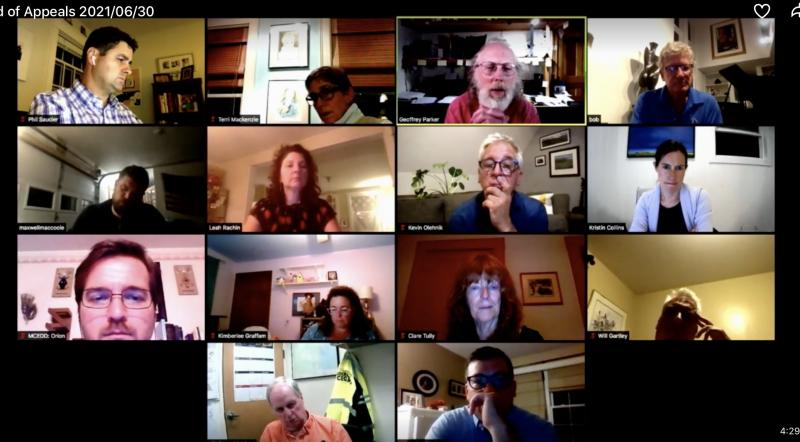ROCKPORT – Possibly the most complicated case to ever land before Rockport’s quasi-judicial Zoning Board of Appeals will wind toward the finish line July 8, when the all-volunteer citizen board will take up two final questions: Did the Code Enforcement Officer apply the wrong ordinance in granting a building permit for a new Village hotel, and was the hotel’s building plan materially changed from the time the Rockport Planning Board approved the site plan to when the CEO considered the building permit.
The ZBA is familiar with the intricacies of the project and the appeal, having already considered another appeal last year concerning the parking aspect of the hotel site plan review.
Maine Superior Court Justice Bruce Mallonee is also familiar with the case, having heard appeals over the past year by Rockport citizens opposing municipal approval of the 20 Central LLC 26-room hotel application. His consideration of Superior Court appeals of the hotel remain ongoing.
Part of the ZBA appeal (read the complete appeal here) asserted that the wrong ordinance governing building permit applications for Village hotels was applied. The appellants said that the 2020 ordinance amendment, which was approved at Town Meeting in August 2020, should have been used. That amendment, approved by voters, limits the number of guest room in the Village to 20.
“The issued building permit is for a 26-room hotel, which is plainly in violation of this standard,” the appellants wrote in the ZBA appeal.
20 Central LLC, however, has countered the argument by citing a 2011 state law, “An Act to Provide Certainty to Businesses and Development.”
It said, according to the hotel developers, that a municipality may not nullify or amend a municipal land use permit by a subsequent enactment, amendment or repeal of a local ordinance after a period of 45 days had passed after the permit received its final lawful approval. (Read the developer’s response to the appeal here.)
But the question remains before the ZBA, the last of two that were tabled on the continuation of the June 30 hearing to the July 8 hearing.
The June 30 hearing, held via Zoom, lasted five hours. During that time, the ZBA dismissed several points of the appeal, but left the last two for further discussion.
The issue concerning material changes to the plan rests on a retractable roof above a proposed bar on the top floor of the hotel.
The other issue, the question of ordinances. At the end of the June 30 meeting, ZBA attorney Leah Rachin told the ZBA it had one more weighty decision to consider.
“And then we have to get to the issue of what I think is of most interest to the courts, is the notion of the board’s jurisdiction to consider this nullification provision, as to the issue of which of the two ordinances should have been applied,” she said.
“And do you have a feel for how long the nullification conversation should last,” asked Geoff Parker, chair of the ZBA.
“I think I have learned from past experience not to put any money on how long things are going to last,” she said.
“Welcome to Rockport,” said Parker.
Board member Bob Hall, who just stepped onto the ZBA in June, asked: “Why would the court be interested in what the Zoning Board of Appeals thinks about how it should apply jurisdiction?”
Rachin referenced other “live issues” that are before Knox County Superior Court now, and “one of those live issues in litigation is which one of those ordinances applies, whether those ordinances are legal.”
But, she added, “a fundamental tenet of law is they [the appellants] have to exhaust their administrative remedies before they go to court and one of those administrative remedies is to appeal the issuance of a building permit.”
One of those issues to be discussed by the board, she said, is: “which ordinance should have been applied to the building permit determination? The previous one, or the new one?”
Hall asked: “So the court wants us to decide this for them?”
“No, absolutely not,” said Rachin. “The court is well aware it has to be the one ultimately making the decision.’
But, she said, the parties must exhaust their right of appeal before it gets to court.
“I don’t see why we have to make any decision at all,” Hall.
“Ok,” said Rachin. “That’s one point.”
“If the court wants to do it, it doesn’t mean we have to,” said Hall.
Rachin disagreed: “No, you do have to make it. If there is an appeal pending before you, you have to address the issues before you. You can’t just decline to address them. You may decide you don’t have jurisdiction and therefore you won’t move forward. But if you have a pending appeal, I don’t think it’s appropriate for this board to say, ‘sorry, we’re not going to do it.’”
Hall responded: “But it’s under appeal in the courts. Why would we make a decision when it is under appeal?”
“What is under appeal in the courts is the last Zoning Board of Appeals and maybe some injunctive relief,” said Rachin.
She said some of the issues may be similar, “but you are presented with issues on your appeal and you must weigh in on it.”
She continued: “I do not believe that this board has any inherent ability or right to stay its own proceedings pending a determination of the court.”
“OK,” said Hall.
Reach Editorial Director Lynda Clancy at lyndaclancy@penbaypilot.com; 207-706-6657
























